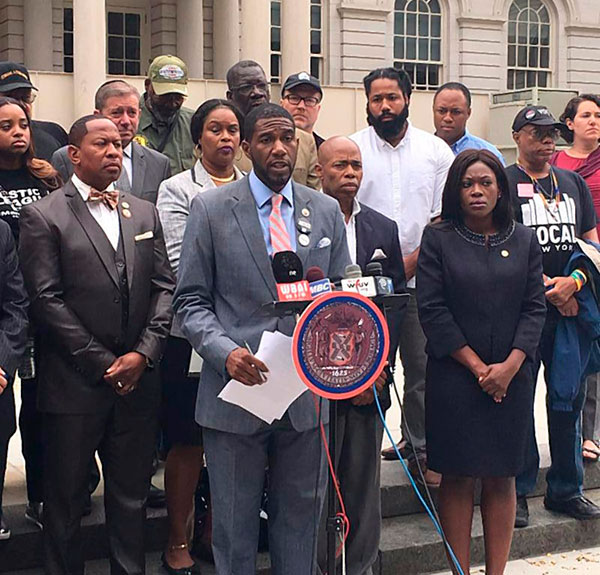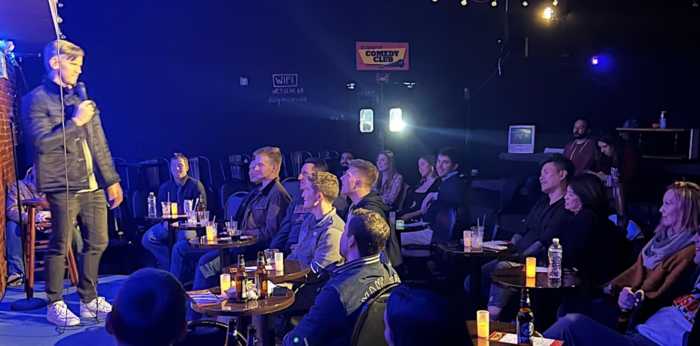Brooklyn Council Member Jumaane Williams, an unsuccessful candidate for the Speaker of New York City Council, is lamenting what he describes as the lack of diversity in top positions in city government and agencies.
“I entered the race for Speaker because I believe that the New York City Council, like the city itself, needs to be a truly progressive, empowered body and advance a bold agenda, especially in this moment, during the time of Trump,” said Williams, the son of Grenadian immigrants, who represents the 45th Council District in Brooklyn.
“While it is clear that I will not be in the role of Speaker, I am part of a body that has many committed to fighting for communities that have historically been disadvantaged, to take on difficult issues and build on the gains that the Council has made in the last four years.”
“One area where we have failed, however, is in the lack of diversity in top positions of power in government and agencies across the city,” he continued. “Most agree that there are systemic issues preventing diversity in leadership that we must confront, I am glad that there are others, like Council member Inez Barron, who have also dedicated their voices to this fight, and I look forward to working with them on these issues.”
Williams said equity must be an issue of “highest priority” for the next Speaker of the City Council, Corey Johnson.
“Having spoken at length with Council member Johnson, he is acutely aware of those concerns, and has agreed, in a tangible and accountable way, to work alongside me on issues of equity, both in government and citywide, for people of diverse backgrounds across race, gender, sexual orientation, and more,” Williams said.
“I look forward to collaborating with Council member Johnson in his new role on many issues, including elevating the concerns of marginalized communities and working to solve the problems that we must all face together in the next four years,” he added.
The City Council, including all four of its Republican members, voted to elevate Johnson as their leader in a 48-to-1 vote.
Johnson, the city’s first openly gay male speaker, succeeded in the rough-and-tumble world of New York City politics, despite completing less than a month of college, at George Washington University, and arriving in the city at the age of 19 without pedigree or money, said the New York Times on Wednesday.
He was, however, possessed with a “preternatural talent for getting to know everyone, and an energy to call and call again, making him something of a ubiquitous presence for nearly everyone in the upper echelons of New York’s public life in recent years,” the paper said.
“The phone is largely an extension of his ear,” said Keith Wright, head of the Manhattan Democratic Party. “He’s an absolute political animal.”
“He’s a late-night person; our phone calls are usually at like one in the morning,” Allen Roskoff, the president of the Jim Owles Liberal Democratic Club, an influential group in gay politics, who helped Johnson get his start in government service on Community Board 4 in Manhattan, told the Times. Johnson rose to become its chairman by age 29.
Born on April 28, 1982, in Beverly, Mass., Johnson grew up in nearby Middleton in a working-class family, the Times said. His mother, Ann Richardson, who attended Wednesday’s vote for Johnson, worked a variety of jobs while raising him and his sister.
His father, David Johnson, born in South Korea to an American father and Korean mother, was an alcoholic who left the family before his son was old enough to remember him, Johnson told the Times.
“My mom dropped him off at work one day when I was 11 months old and he never came home,” Johnson said.
They reconnected only by phone, years later, the Times said.
Johnson said his father died in 2014. He said his stepfather, Rod Richardson, played a more central role in raising him, but also struggled with alcohol and with gambling and died relatively young, according to the Times. “We always had problems with money,” Mr. Johnson said.
Johnson made his way up the Democratic ladder, working for Mark J. Green, then the public advocate, before moving to Green’s failed mayoral campaign and then to a bid for governor by H. Carl McCall, who also lost, the Times said.
It said, in 2004, Johnson was diagnosed as H.I.V. positive.
In 2013, Johnson successfully ran for a City Council seat representing Manhattan neighborhoods, including Greenwich Village, Chelsea and Midtown West that had been occupied by Christine Quinn, then the speaker of the City Council, the Times said.
It said Johnson began lobbying to become the Council speaker early in his first term, in September 2015, traveling the city by transit and taxis (he does not own a car).
He had no white board of names, or a personal system of vote-counting, he told the Times.
“It was all in my head. Seriously,” he said. “My whole strategy was to become either the first or second choice of as many people as possible.”
For some, he was neither, the Times said, stating that a small number of Council members tried to rally opposition during the contest, believing that Johnson’s ambition could lead him to promise one thing to one group of people, and the opposite to another.
But none who felt that way would speak on the record, and on Wednesday all voted for him, the Times said.
“The caricature that was spun about me — no one has been able to point to a single concrete instance or decision,” Johnson said. “It was a rough race. But I’m going to treat everyone with respect. Even the people who didn’t support me.”
In a 22-minute address after his election, Johnson described the Council as “the voice for the voiceless, the champions of the most vulnerable.”
He also vowed to back his colleagues — going through all 50 by first name — and ended with a story of coming out to his Irish Catholic grandfather, the Times said.
“I said, ‘Grandpa, I have something to tell you,’” Johnson recalled to the room of about 200, according to the Times. “‘I told mom and dad that I’m gay.’ And he said, ‘Jesus, Mary and Joseph, I thought you were going to tell me you were a Republican!’”
























